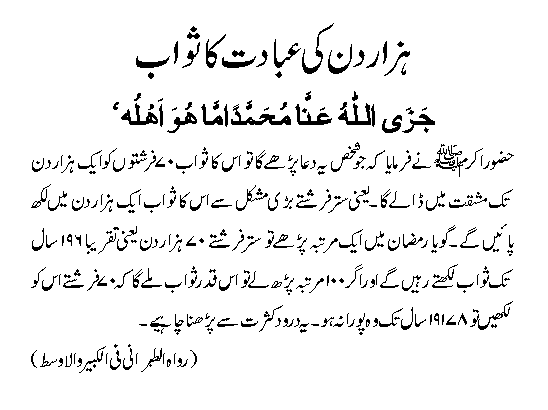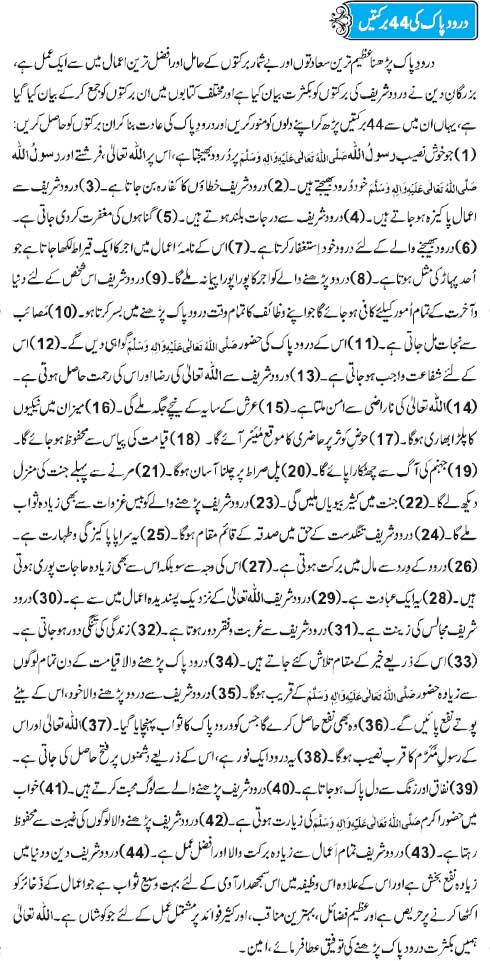
Hazar Din Ki Ibadat Ka Sawab
TAG: Darood
Husn e Khatma: Durood Ka Ihtimam

Husn e Khatma: Durood Ka Ihtimam
Ayat-e-Durood

Darood O Salam Kay Fazail O Barkaat

Darood Sharif Ki Barkat

Never Underestimate Anyone Or Any Reminder
There are moments in life, unexpected, that unfold before our eyes, leaving us in wonder over the Power of the Almighty. Sometimes, Allah sends forth a person who speaks words, few in number, weighty in sincerity, that forever changes our lives.
Sheikh Saleh Al-Meghamisi (may Allah preserve him), Imam of Masjid Quba, went through such a humbling, lesson-laden moment that leaves us with much to reflect on. He relates his story saying:
I was in the intensive care unit, just beginning to regain consciousness after undergoing a 24-hour open-heart surgery when the nurse in charge of me noticed a change in the blood.
He informed a doctor, who informed another. A third doctor was then called, until 14 people, among them doctors and professionals, had gathered to discuss what they should do regarding my case.
They were reading the signals from the devices over my head, and although I had no idea what the situation was, I could read fear in their faces. It seemed that the signals were not pleasant.
They called Dr. Adam, a successful Sudanese doctor, to come and see. He studied the monitor and concluded that there was congealed blood on the heart and that it had to be removed. The news came down on me like a thunderbolt. The doctor sought my permission, and although fear began to overwhelm me, Allah guided me to utter the Shahadah, followed by my head nodding in agreement.
I was disconnected from the devices around me, and the doctor left to prepare for the operation.
At that same moment, there stood to my left a Lebanese nurse who seemed to feel sorry for me due to the situation I was in. Allah guided her to gently remind me:
“Listen. Salli ‘ala al-Naby (send blessings on the Prophet), and your Lord will relieve it.”
Instantly, as anyone would respond, I said: “Allahumma sallee ‘ala Muhammad wa ‘ala Aali Muhammad.” Just like that, I said it.
I said it and all the blood came down.
The signals indicated by the machines differed, and they were unsure as to what had occurred. They called the doctor back. He arrived, looked at the screen, and said, “Sheikh Saleh, what we wanted to do and rid you of, Allah rid you of it from above the seven heavens.”
This story is not about Saleh (the Sheikh). It is about that woman whom Allah granted Tawfeeq to speak these simple words of reminder. And this is based on the teaching of the Prophet (peace be upon him), when Ubayy Bin Ka’b said, “I’ll devote all of my prayers to sending blessings on you.” The Prophet (peace be upon him) said, “In that case, it will protect you from your worries.”
And Allah saved us from this distress with the sending of peace and blessings on his Prophet.
But again, this is not about me personally, it is about the success of this woman so that we do not think poorly of the Muslim women. If someone were to see her guise and dress, they would not assume that she knew Allah even for a moment. While I, known as the Imam and Khateeb of (Masjid) Quba, it did not cross my mind to say those words.
Sheikh’s story carries messages that we ought to reflect on for a moment. From the advice of the nurse, we are brought back to the teaching of the Prophet (peace be upon him) to his companion, Ubayy Bin Ka’b (may Allah be pleased with him).
Ubayy Bin Ka’b narrates: I asked, “O Messenger of Allah (peace be upon him), I send much blessings on you. What proportion of my prayer should I devote to (sending blessings on) you?” He said, “As much as you like.”
I said, “A quarter?” He said, “As much as you like, and if you increased it would only be better for you.”
I said, “Then a half?” He said, “As much as you like and if you increased then it would only be better for you.”
I said, “Then two thirds?” He said, “As much as you like and if you increased it would only be better for you.”
I said, “I’ll devote all of my prayers to sending blessings on you.” The Prophet (peace be upon him) said, “In that case, it will free you from your worries and your sins will be forgiven.” (Jami’ Tirmidhi)
From the Sheikh, we find an example of humbling oneself and accepting the advice of others, regardless of the position we hold. Although he is a person of knowledge, this did not prevent him from heeding the advice of the nurse, responding with immediate action.
Finally, we should never underestimate the value of a simple word of advice. Whatever we know, an effort should be made to teach it to others.
Do not belittle a sincere reminder, of appropriate timing, to your Muslim brother and sister. It may have a dramatic effect on their spiritual well-being; on their heart. Perhaps even literally.
– by Mariam E.
Occasions On Which To Recite Durood Sharif
It should be remembered that it is compulsory to write or recite Durood when writing the name of Rasulullaah صلى الله عليه وسلم,
or when saying his name. This is greatly emphasized in the Hadith and there are grave warnings for the person who goes against this teaching. Also, it is necessary to write the entire Durood after the name of Rasulullaah صلى الله عليه وسلم. The command of Durood will not be fulfilled by writing (saw) or any other shortened form, nor will a person get reward.
يَا رَبِّ صَلِّ وَ سَلَّمِ دَائِمًا اَبَدًا عَلٰى حَبِيْبِكَ خَيْرِ الْخَلْقِ كُلِّهِمْ
1. When passing by a Masjid.
2. When seeing a Masjid.
3. After completing Azaan.
4. On the night of Jumu’ah.
5. On the day of Jumu’ah.
6. On the day of Jumu’ah after Asr.
7. On Monday.
8. In the khutbah of Jumu’a and Eid.
9. During the Takbeeraat of Eid.
10. After the second Takbeer of Janazah Salaah.
11. When placing the deceased into the grave.
12. In the Salaah of Istisqaa-for rain.
13. In the khutbah of Kusoof and Khusoof.
14. When seeing the ka’bah.
15. During Hajj.
16. On Safa and Marwa.
17. When making istilaam of the Hijr e Aswad.
18. At the Multazam.
19. After Zuhr on the day of ‘arafah.
20. In Masjid e Khayf.
21. After completing Talbiyah.
22. When seeing Madinah Munawwarah.
23. When visiting the blessed grave.
24. When completing and leaving the visiting of the blessed grave.
25. When witnessing the signs of Madinah Munawwarah.
26. At Badr.
27. At Uhud etc.
28. In all conditions and at every time.
29. In order to be free from something grave.
30. When meeting relatives and those beloved to one.
31. When going to a gathering.
32. When leaving and separating from a gathering.
33. When completing the Qur’an (at the time of Du’aa).
34. In the Du’aa for memorizing the Qur’an.
35. When getting up from a gathering.
36. Every time when Allah is remembered.
37. When beginning every speech.
38. When mentioning and remembering Rasulullaah e.
39. At the time when spreading and teaching knowledge.
40. When delivering a lecture.
41. When reciting Ahadith.
42. When writing a fatwa.
43. When writing the name of Rasulullaah صلى الله عليه وسلم
Virtues Of Reciting Darood Sharif
The Virtues and Blessings of Reciting Durood upon Nabi (Sallallahu Alaihi Wasallam)
All praise is due to Allah Ta’ala. May the choicest durood (salutations) and salaam (peace) descend upon the noblest of Ambiyaa and Rasuls, our master and leader Hadhrat Muhammad (Sallallahu Alaihi Wasallam) and upon his blessed household and all his illustrious companions.
It is the belief of every believer that those who enjoy the highest rank after Allah Ta’ala are the Ambiyaa (may Allah Ta’ala’s choicest blessings rain upon them), and from among the galaxy of Ambiyaa, the highest in rank and status is Hadhrat Rasulullah (Sallallahu Alaihi Wasallam). Not only was Rasulullah (Sallallahu Alaihi Wasallam) sent to this ummah as the final messenger of Allah Ta’ala and the seal of prophet-hood, but he was also the leader of all the Ambiyaa and Rasuls of the past. The nubuwwat of every Rasul and Nabi of the past was subject to accepting Muhammad (Sallallahu Alaihi Wasallam) as his leader and pledging to support his cause if Rasulullah (Sallallahu Alaihi Wasallam) appeared in his era.
The love that Allah Ta’ala expressed for Rasulullah (Sallallahu Alaihi Wasallam), which can be easily gauged from the style of address in the Holy Qur’an, is unique and exclusive to Rasulullah (Sallallahu Alaihi Wasallam). The honor conferred to Rasulullah (Sallallahu Alaihi Wasallam) by Allah Ta’ala on the occasion of Me’raj was an honor not enjoyed by any other Messenger of the past. Furthermore, when Rasulullah (Sallallahu Alaihi Wasallam) will be ushered into the court of Allah Ta’ala on the day of Qiyaamah to the esteemed pedestal of maqaam mahmood to intercede for the entire humanity, his distinct position will be envied by all the Ambiyaa and Rasuls and their nations.
Rasulullah (Sallallahu Alaihi Wasallam)’s blessings and virtues are so immense and incredible that it is impossible for anyone to enumerate them. Suffice it to say that he will be the leader of the entire creation of Allah Ta’ala on the day of Qiyaamah.
Darood Sharif Ke Fazeelat

Durood Ki Soghat




